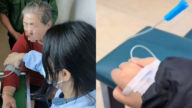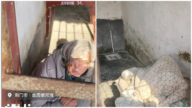【新唐人2012年10月30日讯】近年来,中国大陆不断上演普通民众“被精神病”的事件。很多人批评,精神病院已经成为当局打压上访者和异议人士的工具。最近中共全国人大表决通过《精神卫生法》。其中规定:“精神障碍的住院治疗实行自愿原则”。那么这一法律是否能够终结“被精神病”现象呢?请看本台记者的报导。
10月26号,中共十一届全国人大常委会第29次会议表决通过《精神卫生法》。这一法律是中国大陆关于收治精神病人的第一步法律,历经27年才得以出台。
大陆媒体号称,当初起草这部法律的关键并不是为了防止“被精神病”,但随着一系列“被精神病”事件的被曝光,这一内容成为立法的核心问题。
2003年10月,河南漯河农民徐林东因为反映情况,被乡政府强行送进漯河市精神病院,非法关押长达六年半。
2006年,“武汉钢铁集团公司”职工徐武,因状告单位不公待遇,而被警方和信访部门送进“武钢职工二院”精神科,长达4年。
2009年12月,“深圳市第二人民医院”护士郭俊梅到信访办反映情况,被深圳市“康宁医院”故意诊断为“偏执性精神障碍”,郭俊梅被强行住院治疗。
而这部《精神卫生法》将于明年(2013年)5月1号实施,其中规定:精神障碍的住院治疗实行自愿原则。自愿住院的精神障碍患者可以随时要求出院。但同时规定:诊断为严重精神障碍患者,并且“可能危害他人安全的”,可以由公安机关采取强制措施。
那么,到底该由谁来鉴定精神障碍呢?《精神卫生法》规定,诊断应当由精神科执业医师作出。但现实是,大陆的精神病院和精神科医生往往听命于当局,出示假鉴定结果。比如:上述“被精神病”的郭俊梅,就被司法鉴定医师高北陵故意诊断为“偏执性精神障碍”。而“武汉钢铁集团公司”职工徐武的父母,则在警方和信访部门“不签就判刑”的巨大压力下,被迫在送儿子到精神病院的文件上签字。
北京律师唐吉田:“今后的话,应该考虑相应的这些医疗机构有更大的独立性、更多的专业性,它只对病情和事实负责,而不应该掺杂其他的一些因素。”
北京律师唐吉田认为,中国大陆每一次权力格局的调整都非常困难,但和生命健康相比,一切都不该成为阻碍。
唐吉田:“如果说滥用了公权力、或者公权力干预插手医疗活动,插手医疗的这种专业的业务范围,那么显然存在着对当事人权益侵犯的现实可能。”
网民也质疑《精神卫生法》能够解决“被精神病”的问题,有网友表示:被精神病现象是一种中国现行制度下官本位思想的产物,是这部法律能解决的吗?
香港居民朱柯明,曾经因为起诉江泽民迫害法轮功,而被投入监狱,遭受残酷迫害,他认为,这部法律有很大矛盾,实际上,真正的精神病人基本不会自愿治疗。朱柯明说,中共出台《精神卫生法》只是为了在人权方面掩人耳目,给镇压找借口。当局可以对外宣称:所有被关押的人都是自愿治疗的。
“诉江第一人”朱柯明:“它(中共)不管什么法律,你是绝对不能相信的。它是没有法律的,尤其是在迫害法轮功上是没有法律的。现在这么多人被迫害死了,这么多人被送到精神病院去被迫害、被打药物,成精神不正常了,甚至给迫害死了,太多太多了。它从来没有说是按照法律来做什么事情。”
朱柯明指出,实际上,中共体制号称为人民服务,但官员做的很多事情,比如:残酷打压抗议民众、贪污腐败、出卖领土、活摘器官等等,都是精神不正常的表现。
采访/田净 编辑/李谦 后制/君卓
Will Cases of “the Authorities-Alleged Psychotic Patients”
Stop Recurring in China?
In recent years, cases of “the authorities-alleged
psychotic patients” have continued to emerge in China.
Mental hospitals have become a tool for the Chinese Communist
Party (CCP) regime to repress petitioners and dissidents.
A Mental Health Act was recently approved by votes
at the CCP’s National People’s Congress.
The Act stipulates that “hospitalization of psychotic patients
is made on a voluntary basis.”
Can this Act help to end the incessant occurrence of
“the authorities-alleged psychotic patients” cases?
On October 26, the 29th session of the 11th CCP National
People’s Congress passed a Mental Health Act.
This is the first law introduced in China on treating
mental patients, after 27 years of legislative process.
China’s media claimed that the law originally was not aimed
at preventing cases of “the authorities-alleged psychotic patients”.
However, cases of “the authorities-alleged psychotic patients”
continue to be exposed.
In this context, preventing from being “the authorities-alleged
psychotic patients” became the key reason for introducing the law.
In October 2003, Xu Lindong, a peasant in Luohe,
Henan province
was forcibly sent into local mental hospital for petitioning.
He was illegally detained there for up to six and a half years.
In 2006, Xu Wu, an employee Wuhan Iron& Steel Group,
petitioned over the company’s injustice.
Local police and petition officers confined Xu Wu in a local
hospital’s psychiatric department for over four years.
In December 2009, Guo Junmei, a Shenzhen hospital nurse,
was diagnosed with paranoid mental disorders for petitioning.
The diagnosis was made by Kang Ning Hospital of Shenzhen,
which is operated directly under the municipal Commission
for Health, Population & Family Planning. Guo Junmei was hospitalized by force.
This Mental Health Act will be in effect on May 1, 2013.
It stipulates that hospitalization of psychotic patients is made on a voluntary basis.
And that the voluntary in-patient with mental disorders can
request a hospital discharge at any time.
The Act also provides that if a patient is diagnosed with
severe mental disorders and that he “may endanger others’ safety”,
the public security organs can
take coercive measures against him.
Who are the authorities to identify mental disorders?
The Mental Health Act sets that diagnosis shall be made
by psychiatric practitioners. This is in contrast to reality.
China’s psychiatric hospitals and psychiatrists work for
the authorities to produce false diagnoses.
For example, forensic psychiatrist Gao Beiling diagnosed
Guo Junmei with paranoid mental disorders.
Xu Wu’s parents, threatened by local police and
petition officers, were forced to sign for Xu Wu’s hospitalization as a psychotic patient.
Tang Jitian(Lawyer, Beijing): “In the future, these medical
institutions should be endowed with greater professional freedom.
They should be responsible only to medical service,
instead of being involved in other matters.”
Tang Jitian says that in China, it is always difficult
to make changes in the political power set up.
However, in matters of life and health,
Nothing should be an obstacle.
Tang Jitian: “If a case involves the abuse of public power,
such as intervening in medical treatment professional practice,
the parties concerned may be infringing rights.”
Chinese netizens questioned whether the Mental Health Act
may solve the problem of “the authorities-alleged psychotic patients”.
A netizen asked, “The issue of the authorities-alleged
psychotic patients is a result of the official standard system operated in today’s China, can it be resolved by this Act?”
Hong Kong citizen Zhu Keming was imprisoned and tortured
by the CCP authorities for suing Jiang Zemin for his launching of the persecution of Falun Gong.
Zhu Keming says that there exists a contradiction in this law.
Real psychotic patients basically do not ask for voluntary
hospitalized treatment.
This Mental Health Act actually aims to cover up the truth
about the human rights situation in China,
Zhu Keming remarks. It also serves as an excuse for the
authorities to put down dissent.
In this way, the authorities may declare that all detainees
choose hospitalization on their own volition.
Zhu Keming: “You simply cannot trust any CCP law.
Its action has no legal bearing, especially on its persecution of Falun Gong.
So far, there’re so many Falun Gong practitioners killed
by torture in detention.
Numerous Falun Gong practitioners have been sent into
mental hospitals, injected with unknown drugs causing mental disorders and even death.
The regime never dares to claim it was following laws
in the commission of these actions.”
Zhu Keming remarks that in reality, CCP officials have
presented mental disorders as a reason for what they have done.
Such as brutal suppression of mass protests, corruption,
selling of China’s territories, and live organ harvesting.






























